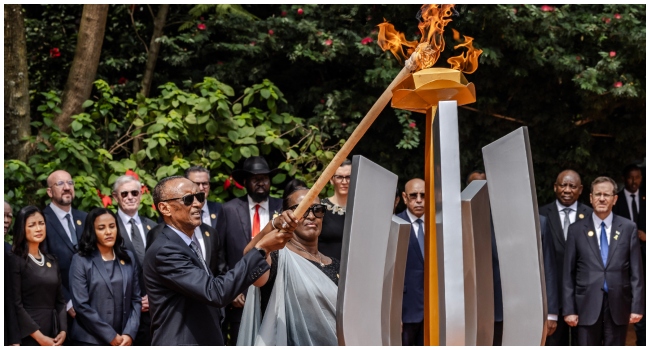Rwanda paid sad respect to genocide victims on Sunday, 30 years after a violent campaign planned by Hutu extremists tore the country apart, turning neighbours against one another in one of the worst atrocities of the twentieth century.
The killing spree, which lasted 100 days before the Rwandan Patriotic Front (RPF) rebel force captured Kigali in July 1994, claimed the lives of 800,000 people, mostly Tutsis but also moderate Hutus.
The tiny nation has since found its footing under the iron-fisted administration of President Paul Kagame, who commanded the RPF, but the violence has left a trail of ruin across Africa’s Great Lakes.
In accordance with custom, celebrations on April 7 — the day Hutu militias unleashed the carnage in 1994 — began with Kagame lighting a memory flame at the Kigali Genocide Memorial, where more than 250,000 dead are thought to be buried.
As an army band played sorrowful music, Kagame placed wreaths on the mass graves, flanked by global dignitaries like as many African leaders of state and former US President Bill Clinton, who had described the genocide as his administration’s greatest failure.
The international community’s refusal to interfere has been a source of lasting embarrassment, with French President Emmanuel Macron likely to issue a statement on Sunday claiming that France and its Western and African friends “could have stopped” the killing but lacked the will to do so.
Kagame will also deliver a speech at the capital’s 10,000-seat arena, where Rwandans will later attend a candlelight vigil for those killed in the massacre.
Sunday’s events mark the start of a week of national mourning, with Rwanda effectively coming to a standstill and national flags flown at half-mast.
Music will not be allowed in public places or on the radio, while sports events and movies are banned from TV broadcasts unless connected to what has been dubbed “Kwibuka (Remembrance) 30”.
The United Nations and the African Union will also hold remembrance ceremonies.
Karel Kovanda, a former Czech diplomat who was the first UN ambassador to publicly call the events of 1994 a genocide, nearly a month after the killings began, said the massacres should never be forgotten.
“The page cannot be turned,” he told media in an interview in Kigali, urging efforts to ensure that “the genocide (doesn’t) slip into oblivion”.
The assassination of Hutu President Juvenal Habyarimana on the night of April 6, when his plane was shot down over Kigali, triggered the rampage by Hutu extremists and the “Interahamwe” militia.
Their victims were shot, beaten or hacked to death in killings fuelled by vicious anti-Tutsi propaganda broadcast on TV and radio. At least 250,000 women were raped, according to UN figures.
Each year new mass graves are uncovered around the country.
In 2002, Rwanda set up community tribunals where victims heard “confessions” from those who had persecuted them, although rights watchdogs said the system also resulted in miscarriages of justice.
Today, Rwandan ID cards do not mention whether a person is Hutu or Tutsi.
Secondary school students learn about the genocide as part of a tightly controlled curriculum.
The country is home to over 200 memorials to the genocide, four of which were added to UNESCO’s World Heritage list last year.
The memorials house skulls, bone fragments, torn clothing and images of piled-up corpses as well as the guns, machetes and other weapons used to carry out the slaughter.
– Fleeing justice –
According to Rwanda, hundreds of genocide suspects remain at large, including in neighbouring nations such as the Democratic Republic of Congo and Uganda.
Only 28 have been extradited to Rwanda from around the world.
France, one of the top destinations for Rwandans fleeing justice at home, has tried and convicted half a dozen people over their involvement in the killings.
The French government had been a long-standing backer of Habyarimana’s regime, leading to decades of tensions between the two countries.
In 2021, Macron acknowledged France’s role in the genocide and its refusal to heed warnings of looming massacres but stopped short of an official apology.



